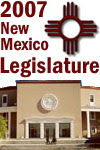 With its opposition to opening conference committees to the public and just about all ethics reform proposals moving through the House, the Senate has done a lot lately to upset reformers.
With its opposition to opening conference committees to the public and just about all ethics reform proposals moving through the House, the Senate has done a lot lately to upset reformers.
A unanimous vote by the lawmaking body on Wednesday means the anger and disappointment will continue to grow.
Senate Bill 363, sponsored by Majority Leader Michael Sanchez, D-Belen, was approved on a vote of 32-0. It would eliminate the requirement that candidates file campaign disclosure reports electronically, and move the state away from better disclosure of money that influences elections.
The Legislature and governor enacted a law in 2003 requiring that candidates, beginning in 2006, file campaign finance reports electronically. It was an attempt to create an online database that would give the public more timely access to information about the money that influences elections.
 In its first year in 2006, the system had problems. Many candidates had a hard time filing, especially with the first reports due in the spring – some because they’re not computer literate and others because the secretary of state’s office set up a mediocre system. Some reports still aren’t online.
In its first year in 2006, the system had problems. Many candidates had a hard time filing, especially with the first reports due in the spring – some because they’re not computer literate and others because the secretary of state’s office set up a mediocre system. Some reports still aren’t online.
With Rebecca Vigil-Giron leaving office at the end of the year, problems with the system weren’t addressed and it was all but abandoned.
While it was operational, however, the system made the reports more easily accessible online. People no longer had to drive to
Under Sanchez’s bill, candidates would no longer be required to file electronically. They could opt to do so, or they could submit paper reports in person or by fax. The secretary of state’s office would then have two weeks to manually input the reports into its database and put the information online – a mandate the bill doesn’t fund.
So let’s see – the secretary of state was told to set up a new system, and did, but it has some problems. Rather than helping fix the problems, Sanchez and the Senate want to make the system optional, which will make it more difficult for the public to get many finance reports in a timely manner and will actually increase the workload of the secretary of state’s office.
Sounds like a recipe for failure.
Are we to assume this is an unintended consequence of Sanchez’s bill, rather than its intent? Why doesn’t the Senate want to improve the current system? Why give up after one year, change courses, and dump a lot more work on an office that’s already sorely underfunded and is having major financial problems?
The best case scenario under the system the Senate has approved is that the public will have online access to finance reports within two weeks. The reports are hardly relevant at that point.
The state needs to be moving toward more timely online disclosure, not away from it. It’s called getting young people involved in government, folks. Politicians frequently complain young people aren’t involved, but bills like this frustrate and alienate computer-savvy generations.
Wednesday’s vote by the Senate was quickly criticized by Gov. Bill Richardson and New Mexico Common Cause Executive Director Matt Brix, according to the Associated Press.
Secretary of State Mary Herrera told the news service her office doesn’t have the staff or resources to meet the two-week deadline the bill imposes.
This bill sets the system up to fail. There’s no good reason for its approval. Keep in mind that we have a new secretary of state, one who has pledged to modernize a Web site Vigil-Giron neglected during her eight years in office.
This is a system that could be improved, if the Legislature were inclined to pledge its support for better public disclosure.
Update, 10:25 a.m.
Kate Nash of the Albuquerque Tribune has written an excellent analysis of the Senate’s actions. You can read it by clicking here.